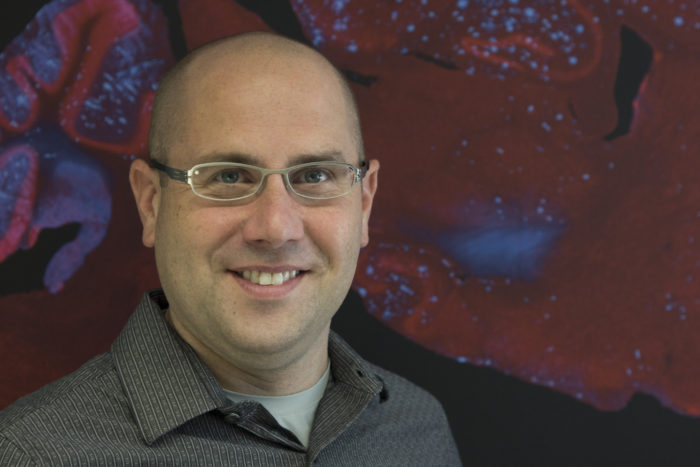Cirrito receives MetLife award for Alzheimer’s research
Researcher is known for developing a way to measure levels of amyloid beta in brain
 Robert Boston
Robert BostonJohn Cirrito, PhD, has been honored by the MetLife Foundation for his work measuring levels in the brain of amyloid beta, a protein linked to the neural degeneration of Alzheimer's disease.
John Cirrito, PhD, an associate professor of neurology at Washington University School of Medicine in St. Louis, has received a MetLife Promising Investigator Award.
Cirrito is one of four researchers honored July 25 in Toronto at the 2016 MetLife Foundation Awards for Medical Research in Alzheimer’s Disease. He is known for developing a way to measure levels of a damaging protein called amyloid beta in the brain. A buildup of amyloid beta has been linked to neural degeneration in Alzheimer’s disease.
“I’m so honored to receive this award,” Cirrito said. “Washington University is a great place to work on Alzheimer’s because so much groundbreaking research has been done – and continues to be done – here. It’s the kind of community where new ideas can grow because there are so many amazing people bouncing ideas off of each other.”
The award comes with a $50,000 institutional grant to support Cirrito’s research.
As a graduate student, Cirrito developed a method of measuring the levels of amyloid beta in mice. One of the hallmarks of Alzheimer’s disease is clumps, or plaques, of amyloid beta, which are associated with damage to nearby brain tissue. At the time Cirrito began his work, little was known about why some people acquired these plaques and others did not.
By allowing researchers to monitor amyloid beta levels in real time, Cirrito’s technique opened up a whole area of research into when and why the protein is produced and cleared from the brain. Cirrito and others who adopted his technique studied the effects of age, sleep patterns, levels of activity and drug treatments on amyloid beta production and clearance in the brains of both mice and humans. Therapeutic strategies designed to treat or prevent Alzheimer’s by reducing amyloid beta levels in the brain are based, in part, on research made possible by Cirrito’s work.
The original technique Cirrito developed measured amyloid beta levels in the brain once an hour. In May, he published a paper describing a new technique accelerating the measurement time to once a minute.
Other MetLife award recipients at the School of Medicine are Randall J. Bateman, MD, the Charles F. and Joanne Knight Distinguished Professor of Neurology; David M. Holtzman, MD, the Andrew B. and Gretchen P. Jones Professor and head of the Department of Neurology; John C. Morris, MD, the Harvey A. and Dorismae Friedman Distinguished Professor of Neurology; Marcus E. Raichle, MD, the Alan A. and Edith L. Wolff Distinguished Professor of Medicine; and Alison Goate, PhD, now at the Icahn School of Medicine at Mount Sinai.








